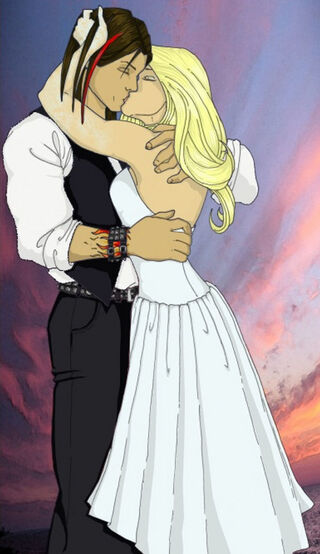Mating
4 Match-Up Types: Which One Do You (Unconsciously) Select?
See why matching with certain types of people leads to unintended outcomes.
Posted March 1, 2021 Reviewed by Abigail Fagan

Many people seek partners based on a list of qualifications, or instinctive attraction to certain types. These approaches don’t consider the flavor that emerges when the features we’re drawn to co-mingle with our own personality.
Different matches create distinct dynamics that emphasize or inhibit aspects of ourselves—impacting how we feel, our state of mind, and who we become. Even with relatively consistent personality traits such as being anxious, who we partner with affects how these traits play out.
Desired qualities and attraction alone typically have little bearing on whether a partnership will create a sustainable match, and instead can lead to unforeseen outcomes.
1. Get me out of jail
Zoe, 18, a high achiever, never felt so alive as with Logan, a handsome, unconventional, spontaneous rebel type. She had always been a compliant “good girl” and lived up to her mom’s strict expectations. Logan represented the promise of freedom from being controlled and brought out a dormant, fearless side of her. Zoe felt a deep identification with him, experiencing herself in a new way — as if becoming her “own person.”
This match-up type, often a “rush,” is fueled by the need for excitement, stimulation, and escape. It attracts people who feel constrained, controlled, empty, or trapped, and is a common denominator in certain midlife crises and affairs.
Surrendering to repressed feelings can be intoxicating, making it easy to lose sight of quieter needs for security or boundaries. Zoe was released but, consumed and overstimulated, she was no longer as grounded or productive as before. Logan failed to provide the space, predictability, and support Zoe relied on, and her personal development became impeded.
Without her usual feeling of agency and independence, Zoe became depressed. Ironically, though attracted to the lure of freedom, the intense merger of this match-up overwrote some of her values and capacities, ultimately recreating the stifling dynamic she had with her mom.
To be free, Zoe needed to claim all parts of herself and develop a more integrated identity of her own. Here, she channeled a “forbidden” part of herself through Logan, leaving her still polarized and incomplete. She did well in a match with someone a bit edgy, but balanced and secure enough to allow her to truly be “her own person.”
2. Admiration junkie
Samantha, 28, successful and attractive, hid insecurity behind a confident facade. Raised by critical parents concerned with status and image, she learned to compartmentalize aspects of herself that could create disapproval. Secretly, she felt unworthy and alone.
Samantha dated men with status who liked her more than she liked them. This made her feel secure, providing a base to maintain her facade while staving off rejection, abandonment, and shame.
Being idealized gave Samantha the illusion of having the “upper hand.” But admiration morphed into possessiveness. Or she was dropped from her pedestal when needing emotional support or otherwise exposing vulnerability, failing to sustain her “perfect” image.
To overcome her attraction to self-defeating dynamics, Samantha learned to:
- Recognize the automatic instincts from the past that compelled her to prove she was loveable and worthy.
- Make things more real early on: Ask questions to get to know dates and be more “out” vs. anonymous.
- Tune in to how she felt during and after the interactions.
- Bookmark familiar trends as “red flags."
3. Cover me, cover-up
Robert, 57, a brilliant scientist, thrived on feeling intellectually omnipotent. Socially he was self-conscious and inhibited, lacking interpersonal skills and emotional awareness. Robert married a dominant woman who needed him to be invisible but brilliant in ways that matched his competence. Their unspoken arrangement felt familiar and safe, protecting Robert from conflict and being exposed.
But this pattern of dominance spilled into career and life decisions that mattered to him. Deprived of personal power, Robert began harboring resentment. Feeling trapped and helpless, his anger increased. When anger overtook fear, he became strong enough to leave.
Later, Robert married a colleague who loved him deeply and was very attracted to him; a new, exciting experience. But to fan her attraction she needed him to be in the more typically “male” role in some ways. Practically, this meant having an “edge” — defining his own position and standing his ground when necessary, even being a bit dominant sometimes.
The dynamic of this match balanced security with incentivized pressure towards growth. His wife's requirement triggered an area of deficiency. But with an intrinsically powerful enough reward, Robert’s avoidant defenses were outstripped, propelling him to expand his capacities and exercise parts of himself that needed development.
4. Sensitivity overkill
Elizabeth, 45, struggled with worry, anxiety, and self-doubt — often needing reassurance. She was drawn to partners who understood and connected with her deeply through vulnerability. Because they were sensitive too, she frequently worried about their reactions or feared driving them away. This dynamic was destabilizing.
Elizabeth finally married Nathan — solid, loyal, and steady. He loved her unconditionally, at first even a bit more than she loved him. Nathan was less sensitive emotionally, though, and didn’t always understand her struggles. But because he wasn’t so permeable like she, and rarely took her reactions personally, he provided the anchor she needed to be her best self.
This relationship was predictable and sustaining for Elizabeth, providing the right atmosphere for a family. With Nathan, she knew she could count on his belief in her and didn’t have to worry about his feelings or driving him away with her insecurity.
Evaluating your match-up
A good measure of the health of a relationship is how it affects our overall well-being and identity, rather than how it feels from the lens of a compartmentalized version of ourselves. Fantasy and instinct-based attractions can mislead us and play out in unforeseen ways.
Depending on the interplay of our own dynamics with our partner’s — the same features that attract us, for example, security or stimulation, can operate in the service of growth or at the expense of other goals and personal development. Recognizing unwanted patterns in our relationships can inspire us to rethink the type of partner we may need and be more conscious of our selection.




